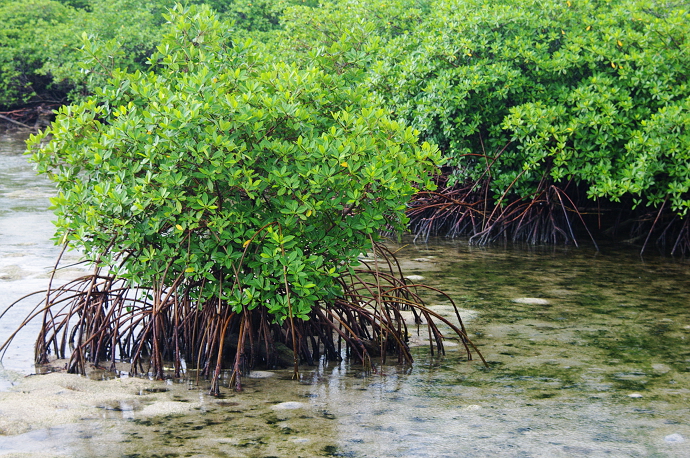Panama’s national defense starts not so much with men and women bearing weapons of death and destruction laying in wait along our shores for some armed enemy. It’s about men and women shoring up the shores, replanting mangrove forests, battling rising seas and ocean pollution, creating new coral reefs and fish hatcheries, and in general adapting to and slowing down climate change. Archive photo of mangroves in Colon province by Eric Jackson.
Economic development still the main story, with a changing context
an explanatory note on the 25th birthday of The Panama News
The economy drives so much else here. The money laundering economy. The drug economy. The informal economy. Babies starving to death. Adults willing to sell their votes to thug politicians for pathetically small gifts. Snobbery that has a few families with many of their members thinking of themselves as superior species. An education system about which the political caste doesn’t care because their kids attend (also inferior) private schools. These tales don’t generally make it into corporate mainstream business and economy news sections, but it has always been the contrarian view of The Panama News that these, not posed photos of men in suits, are economic news and moreover down at their economic bases are the most important stories in Panama.
Was an imperialistic Brazilian corporation handing out huge kickbacks to high-ranking figures of the past three Panamanian administrations? Were Spanish and German and Italian and American companies playing the game, too? Yes, and although those are crime stories, they are also business stories.
Add one chapter of that, the more than a billion dollar Oedebrecht contract to renovate the old Colon city center. Well, fine. Except, the Caribbean Sea is rising. Already inhabited islands in the San Blas Archipelago have had to be abandoned to the sea by Guna Yala officials and residents. So the spiffy new public spaces of Colon have been inundated several times during the Brazilian company’s overpriced work.
Your editor was born in Colon and has seen the fingers pointed and heard so many of the often racist blame assignments. It’s the gringos’ fault for leaving Colon with crumbling water and sewer systems. It’s these uncultured black people who throw trash everywhere, including into the storm drains. It’s these cunning Chinese restaurant owners who dump their used cooking oil into the sewers and storm drains. It’s the National Assembly for short-changing Colon. It’s the Jews, it’s the Arabs, it’s the Venes, it’s fulos in general. And there are just enough individuals who fit every stereotype to make the anecdotal cases for a pack of monstrous lies. We have all of the complained of problems but the sea is rising and the combination of heavy rains and high tide will ever more often flood this square mile of former mangrove swap that’s inexorably losing altitude with respect to the Caribbean Sea.
Will Colon City be abandoned? There are lots of costs, with some opportunities for some, inherent in that. Will we make it a little Venice, with streets dug out to make canals? Outrageously expensive, but maybe that could be done. (Even if Colon is Colon and can’t ever be some other place, just like Panama City can’t and won’t be “The Next Dubai.”) Do we protect Colon with dikes and levees and pumping systems? Also very expensive, but the Dutch or the Chinese can tell us how to do that — it’s very old technology and could create a lot of semi-skilled jobs that Colon residents so desperately need. And you think that Colon has a problem with rising seas? Consider the realities — not the mayor’s lame promises — of Panama City.
Climate change is killing our coral reefs, and with that diminishing our close to shore fisheries. It’s bringing new mixes of insect predators to our farms and gardens. It’s changing our rainfall patterns, and thus the locations of what can be viably grown where. It’s diminishing the water supply upon which our nation’s principal industry, the Panama Canal, depends for its operation.
As the ocean moves inland, as it has been for many years now, the rich will demand compensation for their diminished beachfront property and that may be treated as a political story. But generally not by the rabiblanco media. It was left to The Panama News to cite Matthew 7:24-27 when then president Martín Torrijos’s house on the sand in Farallon was flooded by a sea swell. (Was THAT why Balbina ran for president on a platform that included the closure of “malicious websites?)
Climate change is real. It’s denial will be disrespected in The Panama News every bit as much as Holocaust denial is.
Climate change will form an ever-growing context for the main story about Panama, this country’s economic development. We intend to cover those parts of the stories, with a holistic point of view that pays attention to the science. Panama’s living, the foundation of our national security, depends on the ways that stories we report will be handled.
Contact us by email at fund4thepanamanews@gmail.com
These links are interactive — click on the boxes












